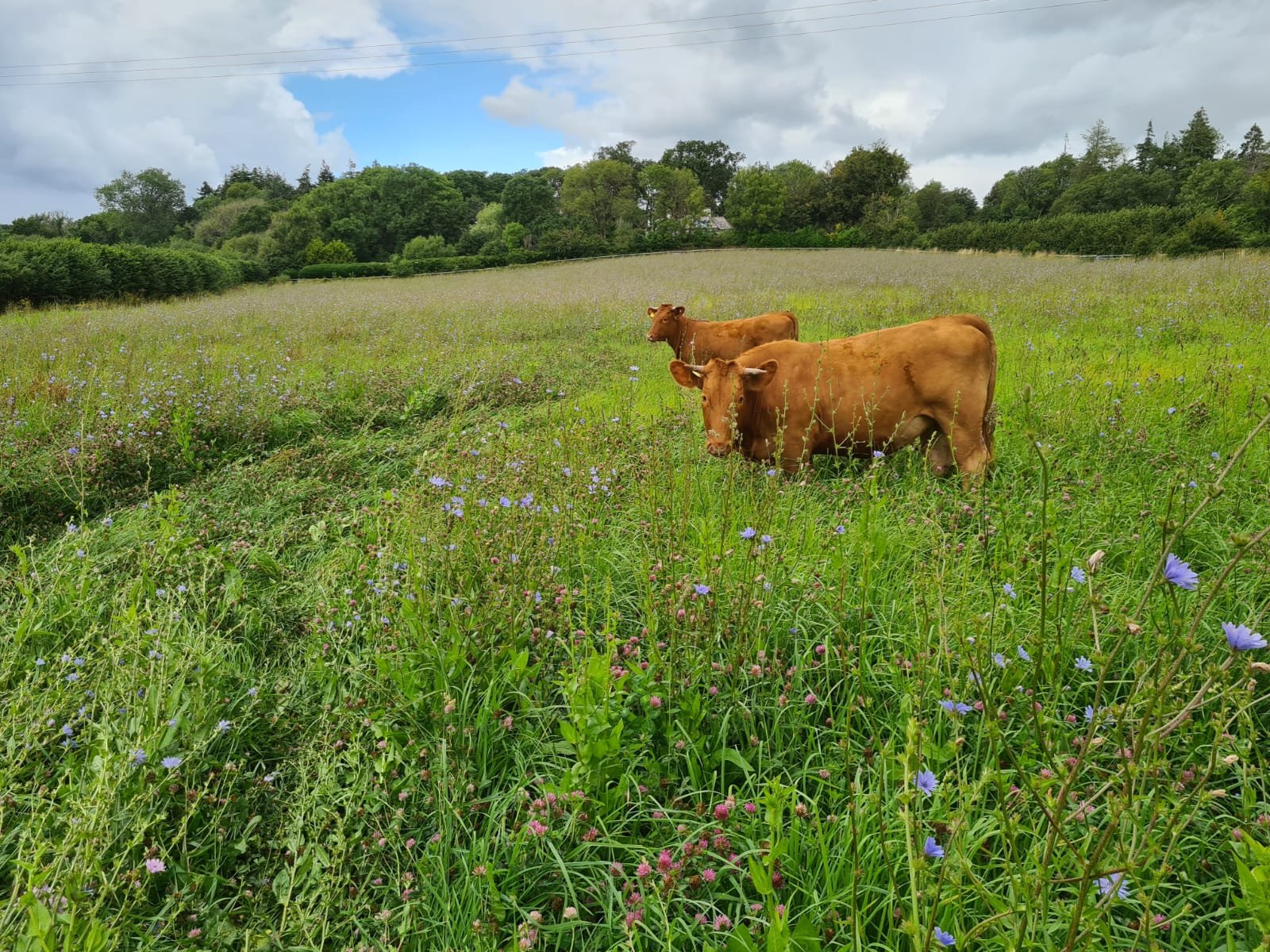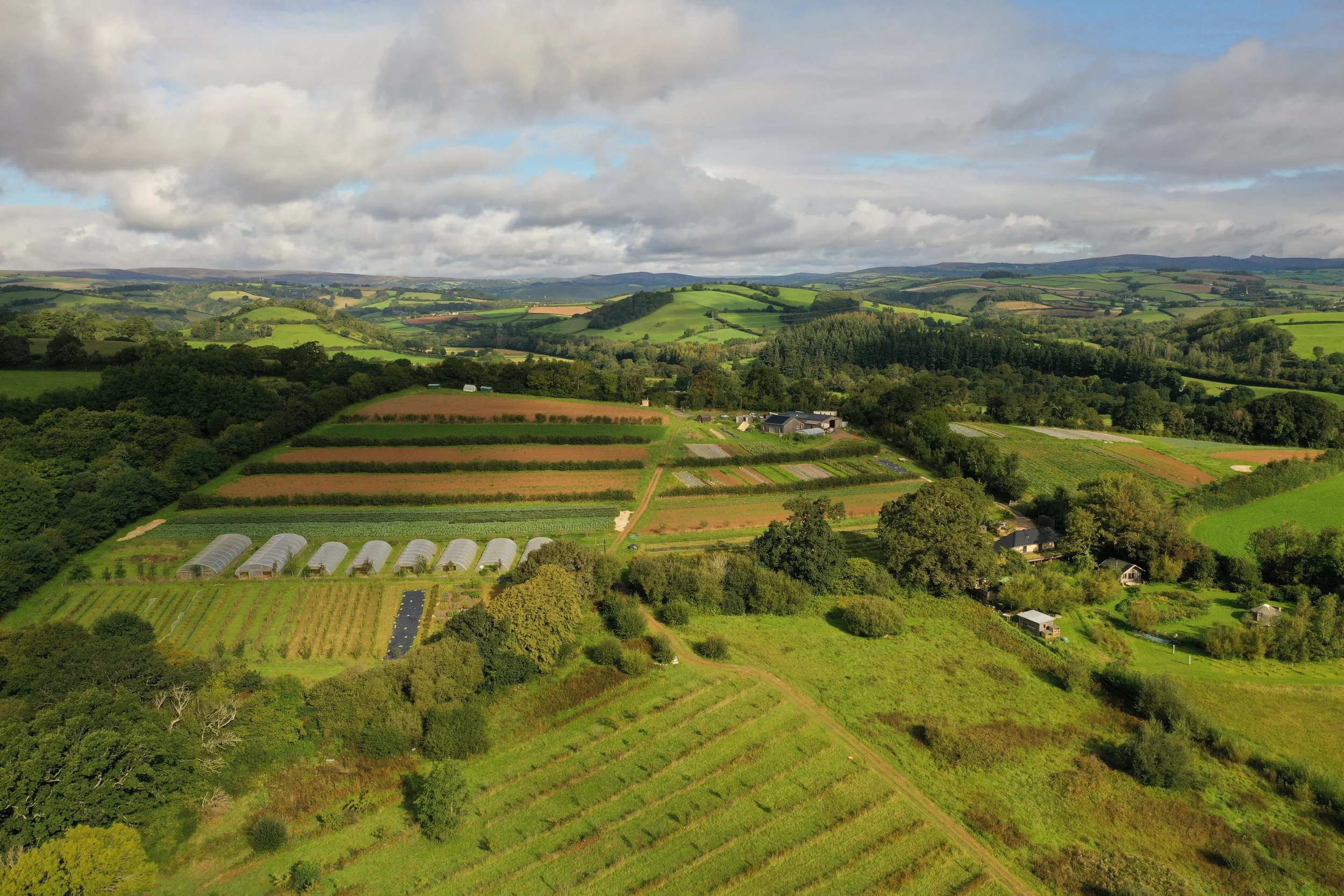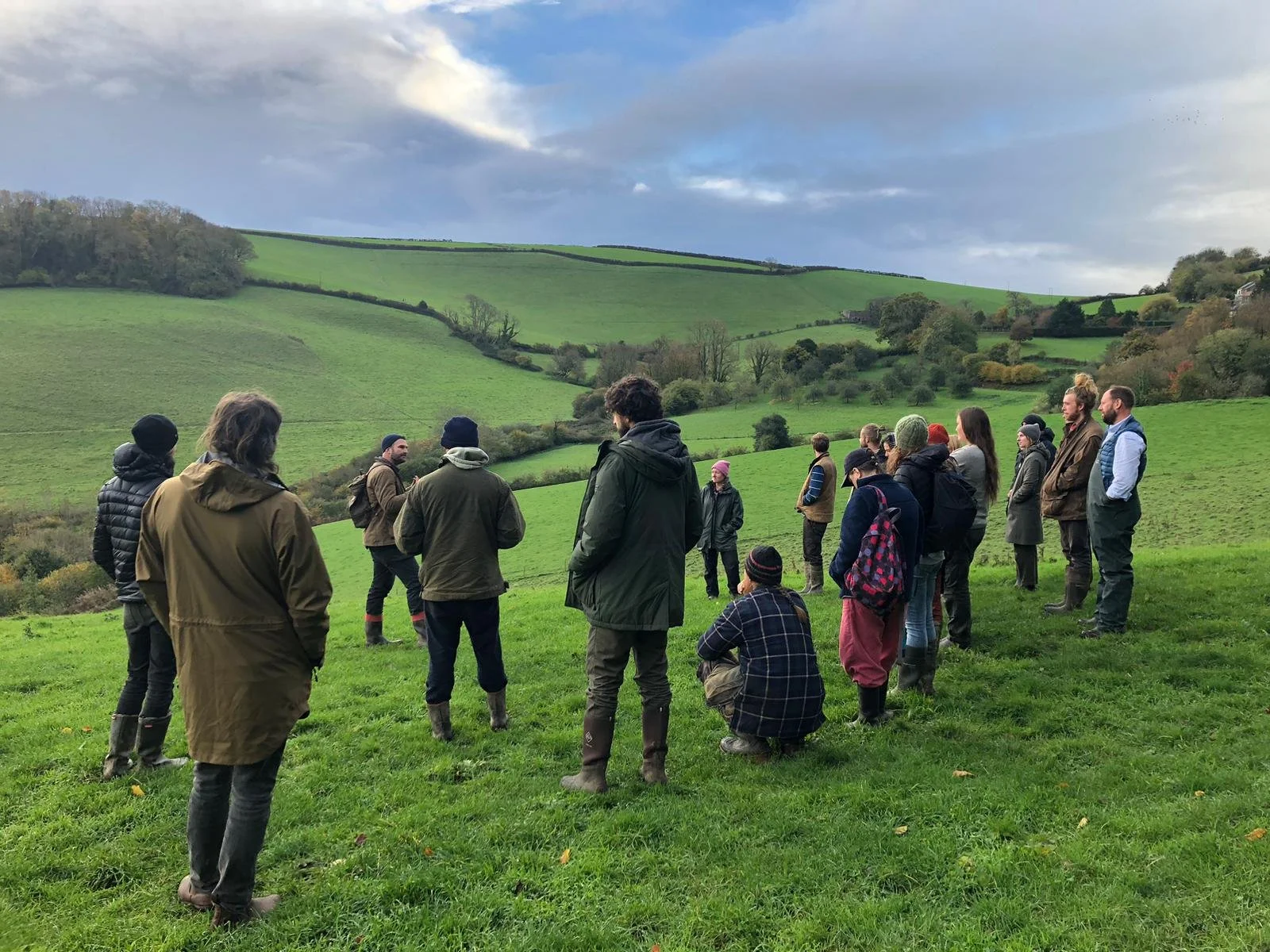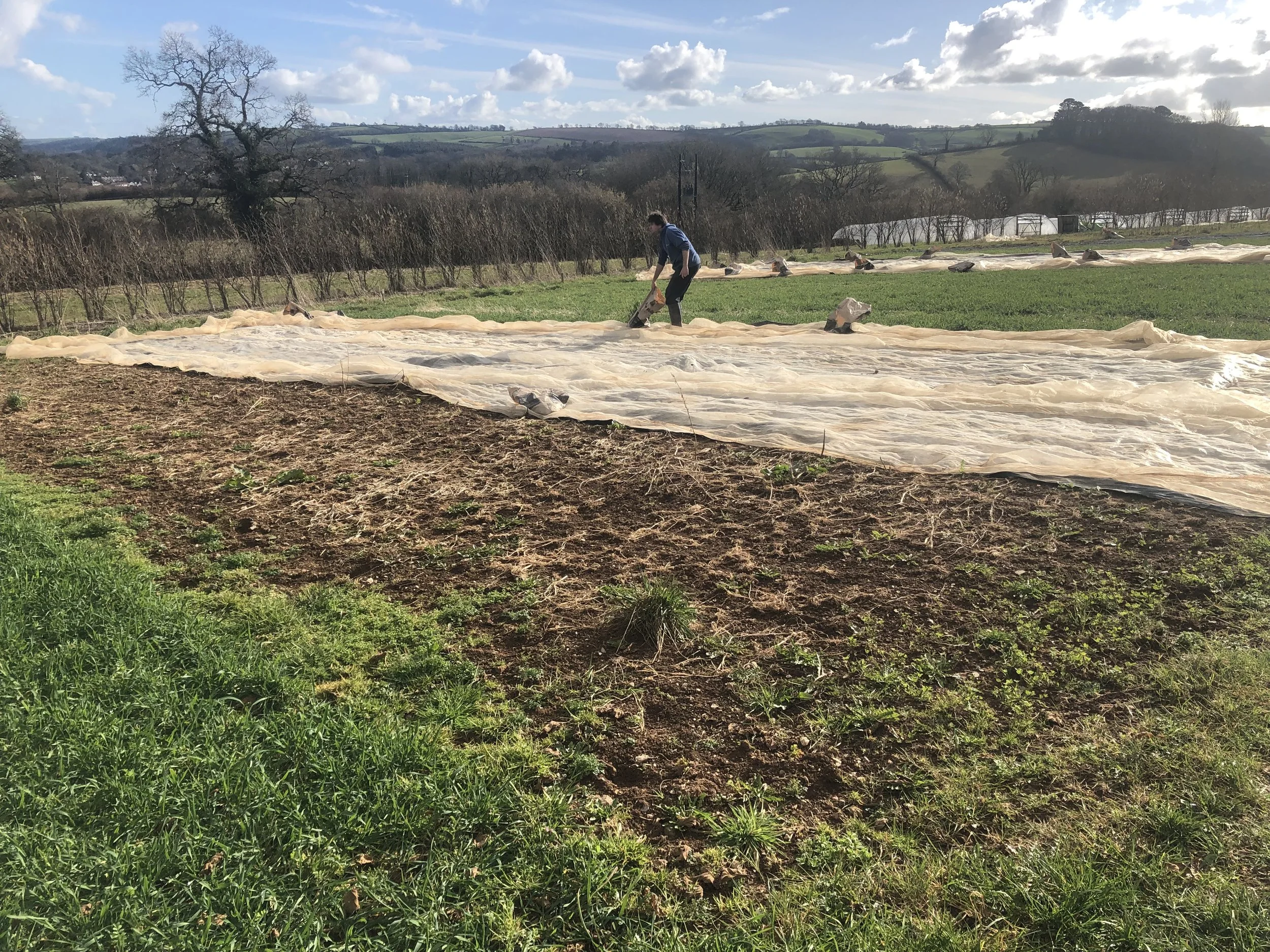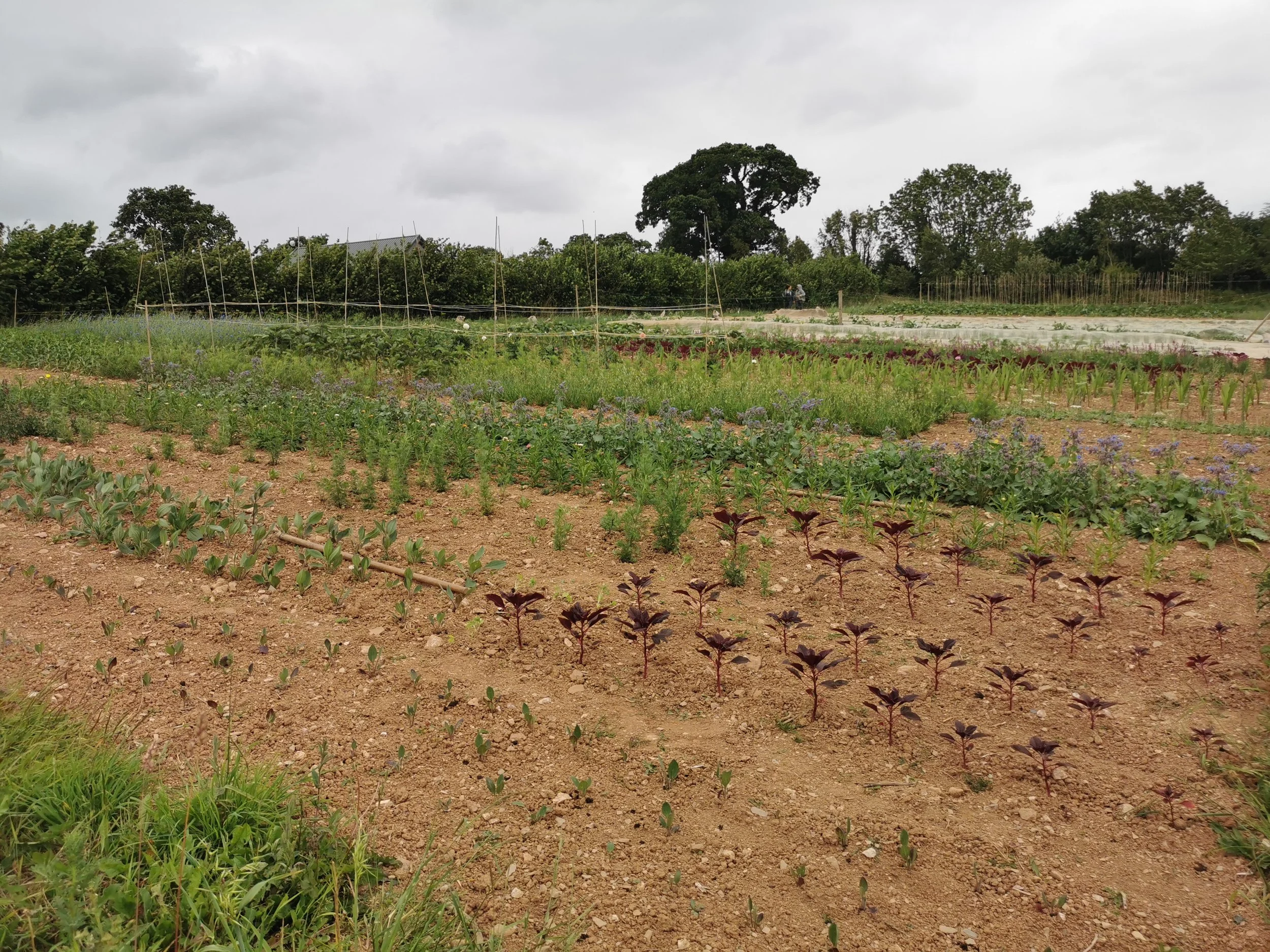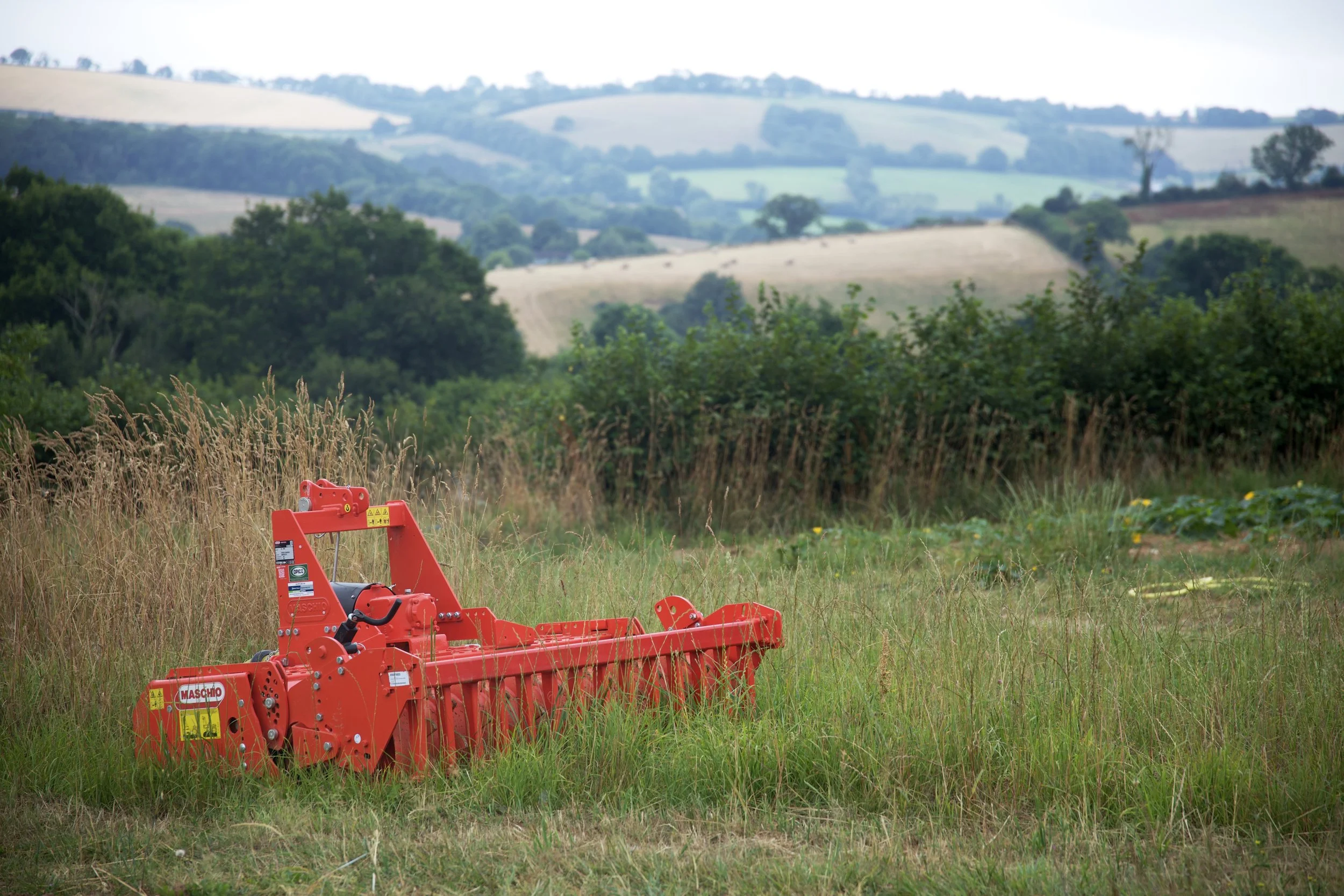Level 3 Traineeship in Regenerative Land-Based Systems: Agroecological Food & Farming
Free for participants and certified by Crossfields, the Apricot Centre @Huxhams Cross Farm presents the Level 3 Yearlong Traineeship in Regenerative Land-Based Systems to help people transition into, or upgrade their skills in, the world of agroecological, organic and regenerative farming methods.
APPLICATIONS ARE NOW CLOSED FOR THE 2025 COHORT, WE ARE LOOKING TO OFFER THE COURSE IN 2026 AGAIN. We are currently developing a government approved paid apprenticeship in agroecology version of the course with Skills England (formerly known as Ifate). While we are in transition, we will offer a new model for 2026. Please watch this space.
The Apricot Centre CIC is once again offering its flagship yearlong Level 3 traineeship with land based learning. The traineeship runs from January to December for 5 days a week (4 days on a placement farm and 1 day learning at the Apricot Centre).
Students may be offered accommodation by their hosts as well as £80 per week training expenses. Students will need to collect and keep expense receipts for the amount the allowance, in accordance with their agreement with their host. The course itself is valued at £6000 and is provided FREE as part of the training alongside the work experience. Students are also offered free counseling, training resources such as books and support for PPE clothing and living expenses.
The traineeship offers an authentic opportunity of working on a farm, in a woodland, or with a food producer alongside a free level 3 qualification in Regenerative Land Based Systems as well as a Permaculture Design Certificate.
The level 3 qualification is Ofqual-regulated and awarded by the Crossfields. The Permaculture Design Certificate is awarded by the Permaculture Association.
***We are currently developing a government approved paid apprenticeship in agroecology version of the course with Skills England (formerly known as Ifate). We hope to offer this new version of the course in 2026. Please watch this space.***
In proud cooperation with…
THE COURSE INCLUDES THE FOLLOWING MODULES:
-
This unit introduces the concepts and methodologies of regenerative land based systems, why they are needed to offset climate change and how to evaluate their impact. In a time of climate change, biodiversity loss and the need to produce healthy food, regenerative food systems are able to meet these challenges. Regenerative systems are a complex set of farming and land based methodologies. In this unit, learners will be introduced to the breadth of these methods and how the impact of them can be assessed in a land based business.
-
This unit introduces learners to soil science concepts and practice, including the carbon cycle and soil biome as key components of regenerative land based systems. Learners will be introduced to recent changes in the understanding of soil science, to include soil ecology and the carbon cycle. They will understand how to manage soil to mitigate and adapt to climate change. They will understand the importance of soil science as a key concept in how to manage land in regenerative systems.
-
This unit introduces learners to the science and ecology of plant and crop growth, which are key components underpinning the management of regenerative land based systems. Learners will understand that regenerative cropping systems are based on ecology, the carbon cycle, and a deep understanding of a reciprocal and circular model of food production. Learners will be introduced to these concepts in the context of crop production and how they can be managed to produce food.
-
This unit introduces learners to the science, nutrition and behavioural aspects of holistic livestock management in regenerative land systems. Learners will understand how livestock can be incorporated into regenerative systems, to improve the soil ecology and biodiversity. Learners will understand how livestock can be managed to reduce their carbon footprint, and to fit into complex carbon and nutrient cycles, and how to maximise their health and welfare in a land based system. The unit will include apiculture and functional biodiversity on a system.
-
This unit introduces learners to the principles and ethics of Permaculture. Learners will be introduced to the origins and principles of Permaculture as a design methodology for designing sustainable land and non-land based systems. Learners will understand how Permaculture is part of a toolkit that can be used for creating regenerative land based systems. Learners will develop an understanding of how Permaculture design practice, ethics and principles are applied to the built environment as well as develop a range of personal and interpersonal skills that inform how they can use these skills in ethical and regenerative systems. This unit leads to a Permaculture Design Certificate (PDC) qualification awarded by the Permaculture Association alongside the Level 3 qualification.
-
Discover how Nature and regenerative farming helps heal us not just physically, and how you can provide more than just food from your land.
-
In this unit, learners will be introduced to the concepts and types of agroforestry systems and their use in regenerative land based systems. Learners will explore how trees are incorporated into the farmed landscape as silvo-arable, silvo-pastoral and silvo-horticulture systems, as well as food forests. They will identify suitable tree species for different soils and sites, and understand the benefits and challenges of using trees in a farmed landscape. They will understand how to design effective agroforestry system for a farm.
-
In this unit, learners will be introduced to provide an introduction to simple business planning methods, business structures and community supported agriculture systems. Learners will explore how regenerative land based systems aim to re-localise sales and shorten the supply chain, and the methods of achieving this. Learners will understand that businesses need to be economically regenerative, pay fair wages, and to become financially sustainable in the long term. Learners will be able to explore how to model business “for purpose” rather than profit.
-
Numbers are not enough for success; you will also learn how to plan the long term future, funding and running of your land-based business.
-
In this unit, learners will be introduced to the principles and practices of Biodynamic farming systems. Learners will explore how Biodynamic farming was the first ecological farming system to arise. They will also understand how it offers a unique approach to farming and food systems. Learners will gain an overview of this system, its principles and practices and its codification, and how it differs from organic systems.
-
In this unit, learners will be introduced to all aspects of water including water cycles and the management and usage of water as part of a whole farm approach. Learners will explore how healthy water management can provide balance in the storing and use of water. They will understand how many traditional ways to hold the water in the landscape that were practiced indigenously all over the world are being rediscovered and redeployed within a modern understanding of geology and the water dynamics of climate and farming. Learners will understand how to apply water management principles it in the context of a farm.
-
In this unit, learners will understand how the quality of food from a regenerative system differs from the quality of food from and industrial food system. Learners will understand how sourcing food from a regenerative system affects consumer health in relation to increasing the range and amount of fresh fruit and vegetables they eat. They will explore how Industrial foods are often are lower in nutrient levels and secondary metabolites as they contain pesticides, and high levels of nitrates, both of which impact human health. Learners will also explore the complex issues of food poverty in regenerative systems.
-
Students spend four days per week on their host farm, learning directly on the land. They write a learning log of their time, as well as have a chance of applying what they have learned on the course directly with the guidance and support of their hosts.
Designed for people 18+, we welcome applications from all diverse backgrounds and life experiences. You will need to have previous qualification of GCSE grade D or above or equivalent. (If you are unable to meet this requirement please contact rachelphillips@apricotcentre.co.uk to discuss alternatives)
PLEASE NOTE MOST PLACEMENTS REQUIRE STUDENTS TO DRIVE AND HAVE ACCESS TO A CAR
THE YEAR LONG TRAINEESHIP WILL PREPARE YOU TO:
Work in agroecological farming or small holding type settings using organic and regenerative practices;
Work in post-harvest roles such as food processing in agroecological food products;
Work in community supported agriculture or the circular food economy;
Work in agroecological land based systems that aim to regenerate the landscape and the soil;
Progress into higher education courses such as our Level 4 Regenerative Food Systems (starting January 2025) and degrees in Agriculture and Rural Studies.
BENEFITS OF TRAINEESHIPS
Benefits for the farmer
Farmers can benefit greatly from hosting traineeship placements as they can provide valuable hands-on experience in sustainable land management practices. By taking on trainees, farmers have the opportunity to share their expertise and passion for farming with the next generation of agricultural professionals.
Trainees also bring fresh perspectives and ideas to the farm, helping farmers to stay current with new advancements in technology and farming practices. This exchange of knowledge can lead to improved efficiency and productivity on the farm.
In addition, hosting trainees can help farmers build strong relationships within the community and industry. By opening their farm to trainees, farmers can become seen as leaders and mentors in the agricultural community, gaining recognition and respect for their commitment to education and sustainability. They also have a chance to connect with other hosts in the field, expanding their network.
Overall, hosting traineeship placements can be a rewarding experience for farmers, allowing them to give back to the industry while also receiving valuable assistance and fresh ideas for their farm operations.
Benefits for the student
A year long traineeship gives a REAL and AUTHENTIC experience about what it is to be a grower, livestock farmer or woodland manager. Learning from an experienced person on the land will give you confidence and valuable practical skills. Couple this with the Level 3 qualification theoretical and practical knowledge in Regenerative Land Based Systems, you will have an excellent basis to start or continue your land based career.
Benefits for the green sector, food, farming and land based businesses
The aim of this training is to train the next generation of farmers and growers in agroecological and regenerative farming systems, this will aid farms and woodlands to sequester carbon and support biodiversity whilst still producing local food and other produce.
HOST PLACEMENTS
This is where we will list the hosts for 2026 as they are confirmed.
The UK Shared Prosperity Fund aims to improve pride in place and increase life chances across the UK investing in communities and place, supporting local business, and people and skills.
For more information, visit https://www.gov.uk/government/publications/uk-shared-prosperity-fund-prospectus










